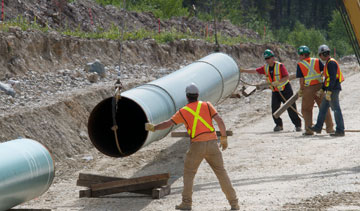
NEB decision to come Friday on plan to triple capacity of Trans Mountain pipeline
by Tamsyn Burgmann, The Canadian Press

Kinder Morgan's plan would add about 980 kilometres of new pipeline and reactivate about 190 kilometres of existing pipeline

Workers install pipe in Jasper National Park as part of the Anchor Loop Project. PHOTO Kinder Morgan Canada
The National Energy Board is set to announce by Friday whether it supports Kinder Morgan’s proposal to triple the capacity of the Trans Mountain pipeline, which carries diluted bitumen from the oilsands near Edmonton to Burnaby, B.C., for export.
The company’s plan would add about 980 kilometres of new pipeline and reactivate about 190 kilometres of existing pipeline. The Westridge Marine Terminal beside Burrard Inlet off Burnaby would also be expanded.
A recommendation in favour of the project would clear the most significant technical hurdle it faces before a final decision is made by the federal cabinet.
One analyst says even if the pipeline isn’t approved, oil will still have to get to market, likely being transported by rail.
“We all know Canada has struggled with the whole pipeline approval process,” said Afolabi Ogunnaike, with global energy consultancy Wood Mackenzie.
“If the pipeline is not approved, then the oil still needs to go forward.”
Ogunnaike said the proposed expansion follows about 70 per cent of the right-of-way along the existing Trans Mountain pipeline.
“Which is different from Northern Gateway, which would be going through more virgin territory, if you will. That’s a distinction between them.”
Environmentalists have demonstrated against the Trans Mountain project, including more than 100 people who were arrested and charged with civil contempt in the fall of 2014. Most of the charges were later dropped.
Energy board spokeswoman Tara O’Donovan said a three-member panel’s review of the project has been based on facts and science, fulfilling a legal mandate to decide whether it is in the public interest.
Kinder Morgan submitted its application in December 2013 and the hearing process began the following April.
The board heard from 35 indigenous groups over 20 days in five cities, accepted evidence from 400 interveners and received another 1,250 letters of comment.
The board requested additional time to consider the project after Trans Mountain said it was considering a pipeline route through Burnaby Mountain. It also sought more time after one board member was appointed and then removed over consulting work he had previously done on the project.
The hearing cost $1.83 million, while more than $3 million was made available to parties that needed financial assistance to participate, O’Donovan said.
Conditions attached to the recommendation could range from addressing the timing of construction to requiring the submission of emergency management plans.
Cabinet typically delivers project decisions within three months, but has extended its Trans Mountain timeline to seven months with a final decision now expected by the end of the year.